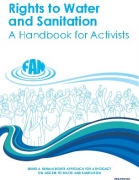 With tihs, they can improve water and sanitation service regulation and provision at international, national and local levels. Directed primarily at community groups, human rights NGOs, rights-based development practitioners and aid workers, this handbook aims to strengthen human rights-based advocacy by providing innovative and practical suggestions that activists and organisations can use in their work. It also acts as a resource guide for finding further information.
With tihs, they can improve water and sanitation service regulation and provision at international, national and local levels. Directed primarily at community groups, human rights NGOs, rights-based development practitioners and aid workers, this handbook aims to strengthen human rights-based advocacy by providing innovative and practical suggestions that activists and organisations can use in their work. It also acts as a resource guide for finding further information.
Water and sanitation are essential for living a healthy life with dignity. However, around a billion people across the world lack access to a safe and sufficient water supply to cover their basic needs. Over 2.5 billion people lack access to adequate sanitation and nearly 1.2 billion face the indignity of open defecation every day.
The Millennium Development Goal (MDG) target to halve the proportion of people without sustainable access to safe drinking water and basic sanitation by 2015 is seriously off track, with sanitation severely lagging behind. For example, estimates suggest that at current rates of progress, sub-Saharan Africa will miss the MDG water target by about 25 years, while the sanitation target may not be reached until well into the 22nd century.
The obligation to ensure that everyone has access to safe clean water and adequate sanitation rests with governments. While lack of both financial and technical resources is in some cases an important barrier to a government’s ability to ensure access to water and sanitation for the entire population, it is crucial to understand that in most instances other factors also play a role. Lack of access to safe drinking water and sanitation can be related to –
- Economic, political and social power imbalances;
- Discrimination against certain groups or communities;
- A government’s failure to prioritise water and sanitation for the poor;
- Lack of political will;
- The exclusion of communities in water and sanitation decision making; and
- Inadequate legal and policy frameworks relating to water and sanitation.
It is these factors that a human rights-based approach to water and sanitation seeks to address. This handbook aims to introduce the main principles of human rights-based approaches to advocacy and tailor them to the needs of those working on water and sanitation. It may be of added use to organizations working on other human rights issues.